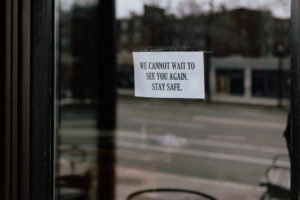What Would a Humanist Do? Helping Those Who’ve Lost Income
 Photo by Kelly Sikkema on Unsplash
Photo by Kelly Sikkema on Unsplash Today we bring you our latest installment of “What Would a Humanist Do?”—offering multiple AHA staff opinions on reader questions. Because while humanists are committed to being good without a god, sometimes they need a little advice on how to pull it off.
Q: A family we’re close to is facing a very different pandemic situation than we are. My wife and I are both teleworking full-time, and our kids are managing remote learning. Our friends are self-employed, one as a hairstylist and the other doing massage therapy and nutrition consultation. Both have seen a drastic decline in work. How can we support them, and in the greater picture, how can people reading this support hourly workers, pay-for-service providers, and gig workers who are unable to work from home and don’t get paid sick leave?
—What Would a Humanist Do?
A’s:
You and your family are very fortunate that you can do your jobs from home, likewise for your children continuing school remotely. According to the Bureau of Labor Statistics, only about 30 percent of people can work remotely as if they were still in the office.
As for being there for your neighbors, I would start small and unassuming. Bring them dinner or a loaf of bread you baked (if you’re anything like me trying to perfect that sourdough starter, you’ll want to share it with the world), or drop off some essential items you may have in surplus (canned goods, toilet paper, dried pasta, etc.). Since a face-to-face conversation probably isn’t smart for you or them, especially if they’re still meeting clients, leave a note and ask them to reach out if they need anything. People are prideful, and might be scared to make the first move if they’re hurting. That’s why, as a humanist, you should make that first move, and simply ask them to reach out if they need anything. No harm is done.
In the big picture, it’s important to be polite and courteous to those who are still working: grocery store clerks, food service workers, and postal workers are perhaps in higher demand since COVID-19 hit. If a delivery app allows you to tip, be generous to the person delivering your order. Consider leaving a care package for your postal worker to show you appreciate them. It’s not an easy time for most people, but you can offer compassion and kindness to those who don’t have the same luxury as you do.
—Sam Gerard
There certainly is a stark difference in the quarantine experience of those who are lucky to just be bored at home (and employed) and those who are truly suffering the economic consequences of shutting the economy down. I myself have been struggling to reconcile continuing on as “normal” as possible while seeing devastating photos of thousands of people lining up their cars at food banks.
While the ultimate fix for all of this is going to come from doctors and economists, there are small things we can do now to help our neighbors in need:
- Purchase gift certificates to hair salons, restaurants, or other local businesses you support. The immediate cash will help them right now, and you can redeem your purchase once things return to normal.
- Exorbitantly raise the tips that you give to any delivery person who receives them.
- If you’re in a comfortable financial position, offer to purchase groceries for your family or friends who find themselves struggling.
- Do a quick search for GoFundMe pages or local shelters that are working to get aid quickly to those who need it.
- Put pressure on your local, state, and federal representatives to pass more comprehensive wage, rent, and sick leave relief.
—Peter Bjork
Start by asking your friends how they’re doing and what support they need. Give them the opportunity to share and vent even if they’re uncomfortable directly asking for help. Listen for ways you can offer assistance based on what they say. For example, “I’m heading to the grocery store tomorrow, what can I get for you?” Or, “you mention you’re running low on toilet paper. I have plenty to share.” If you live near each other and are able to sit at a safe distance (preferably outside), invite them over for a meal or drink or bring the meal to them. If possible, make it a regular gathering.
Help them break down big stressors into manageable tasks like organizing bills and managing clients. Some professions are doing video consultations or tutorials for a fee from home. Maybe you can help them set up and publicize this option. You could also promote their services and recommend people use them once they reopen.
It’s also important to advocate for better economic protections for hourly, pay-for-service, and gig workers now and in preparation for future pandemics. There are many lessons the government and society can take away from our current situation to help us prevent or mitigate future catastrophes.
—Emily Newman
For humanist advice from multiple perspectives on all manner of situations, please send your question to wwhd@americanhumanist.com.
